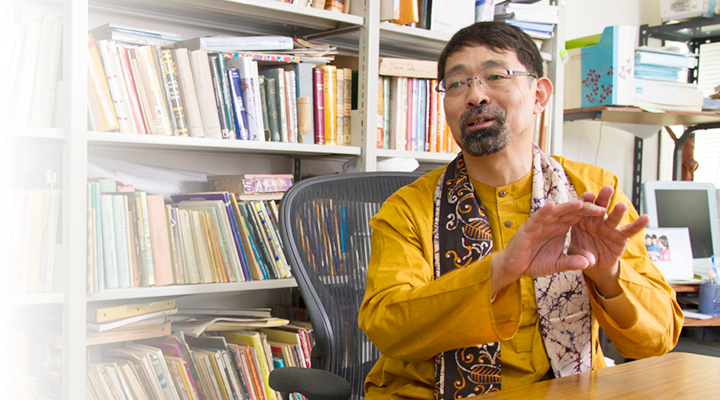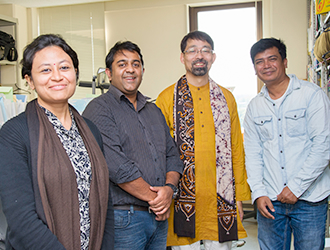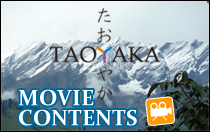
INTERVIEW
Researching South Asian religion and society from the
perspective of cultural anthropology.
South Asia – a region with
great potential where much
can be learned through
interaction
Cultural Creation Course
International Development and Cooperation
Assoc. Prof.Masahiko Togawa
Researching South Asian religion and society from the
perspective of cultural anthropology.
Striving to establish a macro perspective and interdisciplinary framework for research on Indian society

Dr. Togawa has used local languages to approach a wide variety of cultural anthropologic topics in the Bengal region of South Asia that extends from West Bengal, India as far as Bangladesh. Below, we take a deeper look into some of his research.
Interested in Indian society and culture since his years as a student, Dr. Togawa went on to make Bengal, India the focus of his academic research. Later, when he was selected to participate in the Ministry of Education, Culture, Sports, Science and Technology (MEXT) Student Dispatch System to Asian Countries, he studied abroad and carried out field research in India as part of his doctorate studies. He lived in West Bengal for approximately five years during which he observed village societies on-site and completed his doctorate dissertation.

After returning to Japan, Dr. Togawa summarized his findings as a Special Researcher (PD) in the Research Fellowship for Young Scientists within the Japan Society for the Promotion of Science. He then went on to shift his main research site to Bangladesh and verify his findings in West Bengal by comparing them with diverse South Asian society and the Islam world. This new endeavor sought to take existing research on Indian society that had traditionally centered around Hinduism and reinterpret it from an Islam perspective. One could say he also aimed to bring together an interdisciplinary network of researchers and establish cross-regional research methods.
Dr. Togawa then turned his focus to the development of a structure that would facilitate joint, interdisciplinary research that moved beyond specific fields, as well as compiling the results of this research. He formed a joint research group comprised of local researchers in multiple regions, including Sri Lanka, Pakistan, India, Bangladesh and Nepal. His goal was to bring together both domestic and international researchers from different regions and fields of specialization to compare social structures and verify issues in Indian Muslim society and Bangladeshi Hindu society, both of which are religious minorities.

At Hiroshima University, Dr. Togawa has accepted the challenge of connecting existing regional research findings to applied fields such as peacebuilding and conflict studies through collaboration with researchers in these fields.
His work seeks to establish new perspectives and methods in traditional research on regional society. Dr. Togawa plans to continue this unique research with the aim of bringing about a paradigm shift in cultural anthropology; from existing methodology that has tended to focus on micro-level research to methods that position and understand regions in their macro-level cultural context, and from a current framework for regional research constrained by individual countries and languages to one that facilitates comparison and analysis beyond specific regions and fields.
Dr. Togawa also led the University’s first on-site training in Bangladesh

Dr. Togawa oversees the Taoyaka program’s Cultural Anthropology of South Asia class.
In his class, Dr. Togawa uses study of relevant literature to encourage students to deepen their understanding of the true state of South Asia by looking at it from the viewpoints of history, religion, and society.
Meanwhile, Dr. Togawa also lead the University’s first on-site training, conducted in September 2015.
“I designed the five-day program which was packed with the magic of Bangladesh and everyone who participated absolutely loved it,” reports Dr. Togawa. During the program, participants not only toured World Heritage sites, but were also given the opportunity to interact with women living in a village situated in a disadvantaged area and experience the issues they were facing first hand, as well as being taken to visit the remains of Buddhist monasteries said to be a hidden cultural heritage site and having a project thrown at them out of the blue based on the visit.
Dr. Togawa proudly continues. “While the program was only a first attempt and may have been a bit extreme, I’m confident that other universities wouldn’t be able to pull off anything similar.” Apparently the innovative style of the study tour also drew the attention of locals and the tour was featured in a Bangladesh newspaper.

“The tour was designed to be short and intensive and to provide students with an opportunity to grasp the big picture of the situation in Bangladesh. How students go on to connect what they learned and experienced to their specializations is up to them. Students join the study tour after participating in several preparation sessions that get them thinking about how they could contribute on-site, so it’s once they have this field experience that answers to these questions start coming out.”
Dr. Togawa anticipates that students will derive themes from their onsite experience that relate to their respective fields of study; for example, looking at the cultural heritage site exercise, an arts student may think about how to connect such heritage to regional development, or a technology student may think about how to leverage electronics to maintain the cultural asset.
A program sure to deliver learning experiences unparalleled elsewhere

Motivated by a passion for his students, Dr. Togawa has worked hard to promote the Taoyaka program in multiple settings.
“Universities provide students with a wide range of opportunities, and it is through these opportunities that students discover their own capabilities. I think that students will be able to expand their horizons if they can experience globalization first hand and continuously challenge themselves as part of that experience. The Taoyaka program was designed with these objectives in mind, so my hope is that many different students will come and participate in the program,” explains Dr. Togawa.
He points out that with the number of opportunities students have to visit Asian countries through universities increasing alongside globalization, it is going to be increasingly important that these programs are deeply rooted in the society of the host country, and that students can be truly exposed to the fascinating aspects of that country as well as the issues its people face. He says that in this respect, the Taoyaka program has a distinct advantage.
Dr. Togawa adds that, “the area on which the Taoyaka program focusses is the same region that I have been researching for years – so I want to make the most of the insight I’ve gained thus far.”
He also desires to see more people understand the true beauty of the South Asian countries that the program focuses on.
“In my opinion, Bangladesh and India are incredibly active societies made up of fascinating people. They possess completely different backgrounds to Japanese society which underwent both modernization and homogenization, and that’s why it’s so interesting to interact with them. If paired with Japan in a way that each country could both complement and compensate for the other, they could make great partners who generate much synergy,” explains Dr. Togawa enthusiastically.
The Taoyaka program leverages the unique network Dr. Togawa possesses due to his close connections to the field, and Dr. Togawa himself hopes that the program will give students an opportunity to mature even more through interaction with these countries.
![]()
Masahiko Togawa Professor
Research Institute for Languages and Cultures of Asia and Africa
April 01, 2016 – Present: Associate Professor, Research Institute for Languages and Cultures of Asia and Africa, Tokyo University of Foreign Studies
July 1, 2000 - Associate Professor, Graduate School for International Development & Cooperation, Hiroshima University





